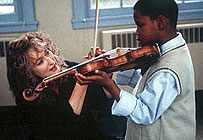|
|
|
|
Music
of the Heart
|
 |
|
I have a weakness for films about heroic teachers fighting miserable school conditions and taking on an impossible task: to initiate a bunch of alienated, poor, violent kids into the divine mysteries of higher mathematics (Stand and Deliver, 1988) or literature (Dangerous Minds, 1995). In Music of the Heart, Roberta Guaspari (Meryl Streep) takes her fifty violins to the underprivileged children of Harlem. As with all films of this type, the action resembles that of a sports story: it's a matter of training, discipline, extra rehearsals and finally the big game – which here is the end-of-year concert, and ultimately (when Roberta's courses are threatened with extinction) a fund-raiser at Carnegie Hall. Roberta is quite a coach. While the teachers around her are bound by protocol, caution and politically correct attitudes, Roberta just barges in. With her students, she is demanding, bullying and merciless. But she is also totally committed and generous, so they all love her. As in Erin Brokovich (2000), the heroine's romantic and family activities suffer because of her obsessive devotion to a cause. Streep brings much vitality and charm to this role. But she is a terribly ostentatious performer: it is seemingly impossible for her to listen to another actor without meaningfully rolling her eyeballs, fidgeting and heaving a sigh. This film boasts some clumsy, point-making dialogue worthy of Australian playwright David Williamson. At one point, an angry, black mother yanks her child out of the class and confronts Roberta: "My kid ain't gonna play no music by dead white males. Can you name me one black classical composer?" Naturally, she is easily talked out of her ideological prejudice. This is in fact a telling vignette, in ways that may have escaped the consciousness of director Wes Craven. Many films about the greatness of the canon of Western art in music, painting and literature have a tough time keeping out all troublesome traces of 20th century popular culture. They are, at heart, fantasies about a high culture frozen in aspic, supposedly relevant to all peoples at all times. Music of the Heart makes one tiny concession to the vast pop traditions outside Roberta's classroom, in a rather awful moment during the Carnegie Hall concert that features a famous 'fiddle' player wearing a cute hat. The rest of the movie exhibits a manic devotion to high culture – its institutions, values and stars – that can only be described as obsequious. All this is directly relevant to Craven and his evolution as a filmmaker. Craven began as a Professor of Literature before letting his hair down with such gruesome, remarkable horror-dramas as Last House on the Left (1972) and The Hills Have Eyes (1977) – films that he today calls "cries of rage". For almost thirty years, all the way to Scream 3 (2000), Craven has found himself a prisoner of the low genres – and he has made no secret of his desire to be accorded respectability and legitimacy as a certified real artist, beyond the cultish acclaim granted by his legion of loyal fans. Music of the Heart tells a heartwarming, true-life story in an efficiently corny way. But Craven tries just a little too hard to live up to the standards of what he calls non-genre cinema – safe, middlebrow and sentimental. It's surely about time for another cry of rage from this talented, troubled soul. MORE Craven: Red Eye, Scream, Vampire in Brooklyn, Wes Craven's New Nightmare, Shocker © Adrian Martin May 2000 |
![]()